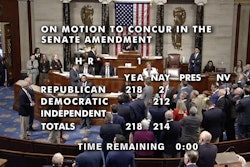Since the June 23 implementation of the Federal Motor Carrier Safety Administration’s Medical Examiner’s Certification Integration (NRII) rule that moves the certificate transmission process to an electronic system, there seems to be some confusion surrounding the new system in some cases.
With the rule in effect, truck drivers and other CDL holders and applicants no longer have to submit a paper Medical Examiner’s Certificate to their state’s driver’s license agency, at least in the states that are compliant with the rule that’s been in the works for a decade.
Now, following a medical exam, the examiner is required to electronically transmit exam results to FMCSA by midnight of the next calendar day following the exam, and FMCSA will electronically transmit exam results to the state driver’s licensing agencies. States will then post the information on the Commercial Driver’s License Information System (CDLIS) driver motor vehicle record (MVR).
As of July 9, there are still 12 states that have yet to implement a system to receive the information from FMCSA: Alaska, California, Florida, Iowa, Kentucky, Louisiana, New Hampshire, New Jersey, New York, Oklahoma, Vermont and Wyoming. In those states, drivers should still receive a paper copy of the certificate and take it to their licensing agency as they have been previously doing.
FMCSA provided this document to offer information for drivers and examiners in states yet to implement the new system.
Yet on that first day of the rule taking effect in states that have implemented the required systems, Trucksafe Consulting President Brandon Wiseman said he heard from four different medical examiners “who had no idea about the change." Wiseman said when this happens, drivers show up to get their DOT physicals, and the examiner still issues a physical medical certificate as they’ve been doing.
[Related: FMCSA’s electronic medical certification system takes effect -- in most states]
Unfortunately for those drivers, that’s “no longer valid proof of that driver’s physical qualifications,” Wiseman added. “Those medical examiners are now supposed to be uploading the results of the CDL drivers’ medical exams to the National Registry of Medical Examiners, and then the National Registry transmits those electronically to the driver’s state licensing agency, taking out the middleman process that we’ve lived with for 10 years, where the CDL drivers had to physically take a copy of their med card to their licensing agency and get it associated with their driving record.”
If that happens and the driver’s previous medical card expires, “they are not physically qualified, even though they hold a physical med card from that medical examiner that didn’t know what they were doing.”
Mark Schedler, senior editor, Transportation, with J.J. Keller and Associates, said he and other J.J. Keller advisors are unaware of any medical examiners who were not aware of the change. That’s not to say they haven’t still observed issues, however.
Schedler noted that despite FMCSA guidance for drivers to request medical cards from examiners, some examiners are refusing because they’re not required to. When an examiner conducts exams in a state that has transitioned to the new electronic transmission system, but the driver may be licensed in one of the states that has not transitioned, a problem can arise.
One thing from the examiner side that J.J. Keller experts have observed is that many “are not aware of the error resolution process or not quick with the corrections so the CDL driver's information would successfully transfer to the state licensing authority,” Schedler said. When there are errors in the information being transmitted, the medical examiner will receive an error message in their National Registry account, and FMCSA requires them to respond immediately.
To help speed up that process, FMCSA recommends that examiners take a copy of each CDL so they have the key information that is most likely to cause a transfer error message if incorrect, which includes the driver’s last name, date of birth, state of licensing, and license number.
[Related: FMCSA med card transfer to states going electronic]
Recommendations to avoid issues at roadside
Schedler recommends that every CDL holder ask for a physical copy of their medical card at each exam. Even though this won’t count at roadside as proof of medical certification, it would be something to show enforcement in case information doesn’t transfer immediately. He also recommended drivers share that card with their carrier, if applicable, so the carrier also has proof that the driver was not disqualified to drive.
Trucksafe’s Wiseman recommended calling ahead to whichever clinic or doctor you plan to use for your medical exam to ensure they’re prepared to electronically transfer the information to FMCSA.
And while carrying a paper copy of the medical card could potentially help at roadside if there are problems with the transfer, Wiseman said he “wouldn’t bank on it if I were that driver or if I were that carrier that employs that driver.”
He noted that “FMCSA has been pretty clear that if you’re in a state that has the system in place and it’s just an issue with your medical examiner not knowing the change, that physical med card that you happen to have gotten from that medical examiner is not proof of your physical qualifications. The only valid proof going forward under this new electronic transmission system that you have an up-to-date physical exam” is on your MVR.
Even if a motor carrier has a physical copy of the medical card but doesn’t see the new med card associated the driver’s license, that driver “might as well just not have been medically certified again,” Wiseman added. “It’s the same consequences, so it puts you in a bad place if you’re that driver or you’re that carrier -- and it runs you quite a bit of risk because violations for using an unqualified driver, which is essentially what that driver is now, are pretty severe from a regulatory standpoint and also from a highway accident exposure standpoint.”
If a driver’s updated medical information doesn’t show up on their MVR within two to four days following their exam, J.J. Keller’s Schedler said FMCSA’s recommendation is to check with the examiner first to ensure they have not received any error messages related to the transfer. After that, check with the licensing agency -- which he said is where his firm has seen issues with error corrections and states having to pull information from the National Registry.
According to Schedler, drivers in Arizona should also be aware that the state has only been listing drivers as “certified” or “not certified” on the MVR with no additional information. FMCSA, however, requires that states also display the issue and expiration dates, self-certification type, and examiner information. Schedler said the state is working to correct the issue.
Finally, drivers should plan ahead to get their medical exams done at least two to three weeks before their current medical card expires. Schedler said drivers “have to come to exams with information to show compliance with sleep apnea treatment and other information which they should be aware of from their last exam.” In these cases, if drivers don’t bring the necessary information to the exam, they could be put into “pending” status for 45 days to bring the information, but if the expiration date on their MVR passes during that time, they are disqualified from driving.
[Related: You failed your DOT physical. Now what?]











